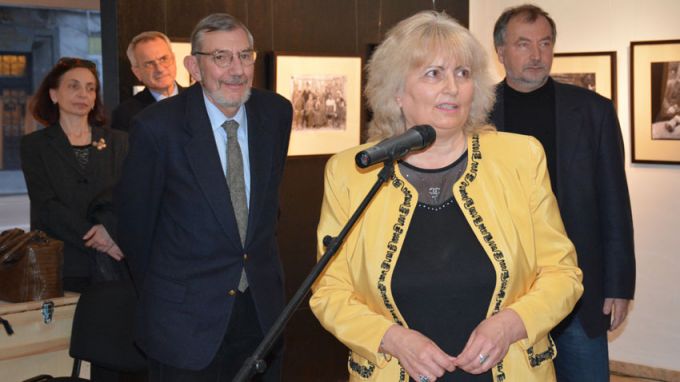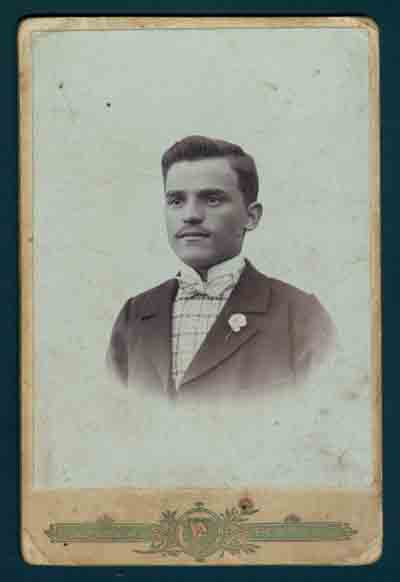 3
3
An exhibition dedicated to one of the most interesting Bulgarian photographers has opened in the Sredets Gallery of the Bulgarian Ministry of Culture. Krum Savov was born in the Rhodope village of Ustovo in 1882, says head of the State Archives in Smolyan and researcher Zoya Nacheva. As a child Krum Savov lost his father but fell under the influence of his uncles Atanas Kelpetrov, secretary of the revolutionary band of Captain Petko Voyvoda and Konstantin Dunovski - father of founder of the White Brotherhood, Petar Dunov. A major role in his life played also his cousin Stoyu Shishkov who sent him to study photography in the cartography school.
 Stoyu Shishkov was a linguist, ethnographer and a renowned figure, who in addition to opening a workshop for his cousin in Chepelare took him during his expeditions to the border between newly-liberated Bulgaria and the territories that were still part of the Ottoman Empire. The first photos of Krum Savov were published in the Rodopski Napredak Magazine and show the Balkan War (1912-1913) and the attempt of the Holy Synod to make Bulgarian Muslims return to their former Christian faith, as well as the gatherings in Rozhen of families separated by the border.
Stoyu Shishkov was a linguist, ethnographer and a renowned figure, who in addition to opening a workshop for his cousin in Chepelare took him during his expeditions to the border between newly-liberated Bulgaria and the territories that were still part of the Ottoman Empire. The first photos of Krum Savov were published in the Rodopski Napredak Magazine and show the Balkan War (1912-1913) and the attempt of the Holy Synod to make Bulgarian Muslims return to their former Christian faith, as well as the gatherings in Rozhen of families separated by the border.
“The exhibition was prepared by artist and photographer Ivo Hadzhimishev based on the photographic glass plates, preserved in the State Archives in Smolyan, the History Museum in Asenovgrad and the Ethnography Museum in Plovdiv. These are the three institutions that keep the legacy of Krum Savov. These precious photographic plates stayed hidden in metal boxes for a long time but thanks to Ivo Hadzhimishev they were digitalized. This way we created an album that includes some 130 photos. A total of 53 photos were included in this exhibition. Ivo Hadzhimishev managed to revive the images that were marred by time in order to show them to the people and the world.”
The task of Krum Savov was not an easy one. He used to carry his heavy equipment by himself and with the help of a mule. The archives keep over 1000 of his images made with precision and lots of love. During that time people were often afraid to get photographed. But Krum Savov managed to win their trust and they readily stood in front of his camera. He captured weddings, craftsmen, landscapes, and scenes from the everyday life. And more: he took the first images of the Rhodope folk costumes and later sent the photos to Prague ateliers where they were colored. At the beginning of the 20th century Krum Savov took part in two world exhibitions – in Liège and in London, where he won the silver medal for his work.
This exhibition is a dream come true for the daughter of the photographer - Nedyalka who, hoping to save the photographic plates, gave them to writer Nikolay Haitov / 1919 - 2002 / When he fell ill, he gave them to the museum in the town of Asenovgrad. The idea for this exhibition came from Zoya Natcheva and her husband. They also established a connection with cultural institutions in Xanthi and so this visual wealth will start traveling the world.
Ivo Hadjimishev cares about people's willingness to bring back the memories of the places they were born in. He is a master of portrait photography, but has long been concerned with the preservation of photographic collections and he organizes mainly documentary exhibitions. “The primary mission of this exhibition is to remember a man with a huge contribution to the creation of the visual memory of Bulgaria,” he says. “The first time I first saw the negatives, I realized that this is a pristine spring.”
In order to finance the exhibition Hadzhimishev turned to his friends in the US Nelly and Robert Gibson. Nelly is of Bulgarian origin and together with her husband they created the American Foundation for Bulgaria, which helps in preserving the history of Bulgarian photography.
English: Alexander Markov
Sofia is the third city to host the sixth edition of the OKO International Ethnographic Film Festival , after the Ukrainian capital Kyiv and the city of Bolgrad were its hosts from September 5 to 14. The OKO film festival has a mission - to..
"A book filled with lots of humour, but also truths that can be painful" - Peter Georgiev Ray opens the curtain on his new novel "The Day My Virginity Was Taken." The premiere will take place on October 6 at Gallery Bulgari in Sofia...
More than 30 galleries and artist collectives from 12 countries will showcase the work of emerging and established artists at Sofia Art Fair 2025. The second edition of this contemporary art forum will take place from 2 to 5 October at Sofia Tech Park...
Canada-based Bulgarian artists Petar Boyadzhiev and Daniela Zekina will present their joint exhibition “AlterEgo” in Chicago on November 1 . Their new..
Sylvia Tomova, a star of the Bulgarian stage, received her training at the Vaganova State Ballet Academy in Saint Petersburg. Her career has been closely..

+359 2 9336 661
